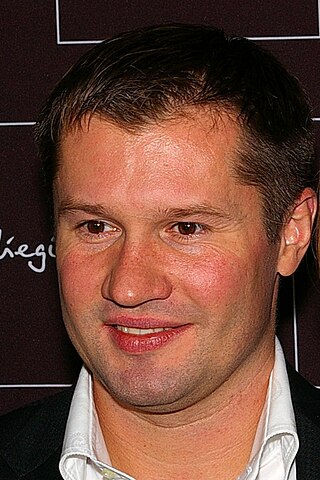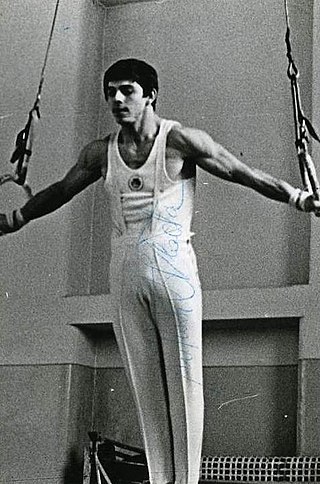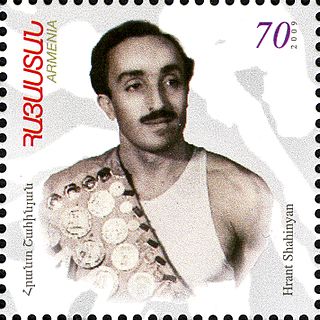
The men's individual all-around competition was one of eight events for male competitors in artistic gymnastics at the 2000 Summer Olympics in Sydney. The qualification and final rounds took place on September 16 and 20 at the Sydney SuperDome. There were 97 competitors from 32 nations. Each nation could enter a team of 6 gymnasts or up to 2 individual gymnasts. The event was won by Alexei Nemov of Russia, the nation's first victory in the event. Nemov, with a silver medal in 1996, became the 12th man to earn multiple medals in the all-around. Yang Wei of China took silver. Oleksandr Beresch earned bronze, Ukraine's first medal in the event.

The men's vault competition was one of eight events for male competitors in artistic gymnastics at the 1996 Summer Olympics in Atlanta. The qualification and final rounds took place on July 20, 22 and 29th at the Georgia Dome. There were 105 competitors from 31 nations, with nations in the team event having up to 7 gymnasts and other nations having up to 3 gymnasts. The event was won by Alexei Nemov of Russia, the nation's first victory in the men's vault after the dissolution of the Soviet Union. Yeo Hong-Chul gave South Korea its third consecutive podium appearance in the event, this time with silver. Vitaly Scherbo of Belarus was the fifth man to win multiple medals in the vault, adding bronze to his 1992 gold.

The men's pommel horse competition was one of eight events for male competitors in artistic gymnastics at the 1996 Summer Olympics in Atlanta. The qualification and final rounds took place on July 20, 22 and 28th at the Georgia Dome. There were 102 competitors from 31 nations, with nations in the team event having up to 7 gymnasts and other nations having up to 3 gymnasts. The event was won by Li Donghua of Switzerland, the nation's first victory in the men's pommel horse since 1928. It was the first time since 1980 that the pommel horse did not have a tie for first place. Marius Urzică earned Romania's first pommel horse medal with his silver, while Alexei Nemov earned Russia's first as a nation separate from the Soviet Union with his bronze.

The men's rings competition was one of eight events for male competitors in artistic gymnastics at the 1996 Summer Olympics in Atlanta. The qualification and final rounds took place on July 20, 22 and 28th at the Georgia Dome. There were 102 competitors from 31 nations, with nations in the team event having up to 7 gymnasts and other nations having up to 3 gymnasts. The event was won by Jury Chechi of Italy, the nation's first victory in the men's rings since 1924 and first medal in the event since 1964. There was a tie for silver, between Szilveszter Csollány of Hungary and Dan Burincă of Romania. It was the best result so far for either nation; Romania had previously had a bronze medalist but this was Hungary's first trip to the podium in the rings.

The men's parallel bars competition was one of eight events for male competitors in artistic gymnastics at the 1996 Summer Olympics in Atlanta. The qualification and final rounds took place on July 20, 22 and 29th at the Georgia Dome. There were 106 competitors from 31 nations, with nations in the team event having up to 7 gymnasts and other nations having up to 3 gymnasts. The event was won by Rustam Sharipov of Ukraine, the nation's first victory in the men's parallel bars after the dissolution of the Soviet Union. Jair Lynch earned the United States' first medal in the event since 1984 with his silver. Defending champion Vitaly Scherbo earned bronze for Belarus. He was the sixth man to win multiple medals in the parallel bars.

The men's horizontal bar competition was one of eight events for male competitors in artistic gymnastics at the 1996 Summer Olympics in Atlanta. The qualification and final rounds took place on July 20, 22 and 28th at the Georgia Dome. There were 105 competitors from 31 nations, with nations in the team event having up to 7 gymnasts and other nations having up to 3 gymnasts. The event was won by Andreas Wecker of Germany, the nation's first victory in the men's horizontal bar since 1896. Wecker, who had won silver four years earlier, was the ninth man to win multiple medals in the event. Silver in 1996 went to Krasimir Dunev, Bulgaria's first horizontal bar medalist since 1980. There was a three-way tie for bronze: Russia and Belarus earned medals in their first independent appearances with Alexei Nemov and Vitaly Scherbo, respectively, while Fan Bin earned China's first medal in the event since 1984.

The men's individual all-around competition was one of eight events for male competitors in artistic gymnastics at the 1996 Summer Olympics in Atlanta. The qualification and final rounds took place on July 20, 22 and 24th at the Georgia Dome. There were 111 competitors from 31 nations. Each nation could enter a team of 7 gymnasts or up to 3 individual gymnasts. The event was won by Li Xiaoshuang of China, the nation's first victory in the event and first medal of any color since 1984. Two nations making their debut as independent nations after the dissolution of the Soviet Union took silver and bronze. Scherbo had won the event as a member of the Unified Team in 1992; he was the 11th man to earn multiple all-around medals.
The men's vault competition was one of eight events for male competitors in artistic gymnastics at the 1992 Summer Olympics in Barcelona. The qualification and final rounds took place on July 29 and August 2 at the Palau dels Esports de Barcelona. There were 93 competitors from 25 nations, with nations in the team event having 6 gymnasts while other nations could have up to 3 gymnasts. The event was won by Belarusian Vitaly Scherbo of the Unified Team, the first victory by a Soviet or former Soviet in the event since 1980. The silver went to Hrihoriy Misyutin, a Ukrainian also competing for the Unified Team. Yoo Ok-ryul gave South Korea its second consecutive bronze medal in the men's vault.
The men's pommel horse competition was one of eight events for male competitors in artistic gymnastics at the 1992 Summer Olympics in Barcelona. The qualification and final rounds took place on 27 July, 29 July and 2 August at the Palau d'Esports de Barcelona. There were 93 competitors from 25 nations, with nations in the team event having 6 gymnasts while other nations could have up to 3 gymnasts. For the third consecutive Games, the pommel horse ended in a tie for the gold medal. Belarusian Vitaly Scherbo and North Korean Pae Gil-su shared the top place. It was North Korea's first medal in the event. Bronze went to Andreas Wecker of Germany.
The men's rings competition was one of eight events for male competitors in artistic gymnastics at the 1992 Summer Olympics in Barcelona. The qualification and final rounds took place on 27 July, 29 July and 2 August at the Palau dels Esports de Barcelona. There were 93 competitors from 25 nations, with nations in the team event having 6 gymnasts while other nations could have up to 3 gymnasts. The event was won by Vitaly Scherbo of the Unified Team, the fourth time in five Games that a Soviet or former Soviet gymnast won the rings. Li Jing of China earned silver. There was a tie for third, with Andreas Wecker of Germany and Li Xiaoshuang of China each receiving bronze medals. It was the first medal for unified Germany since 1936, though East Germany had won gold and bronze in 1988.
The men's parallel bars competition was one of eight events for male competitors in artistic gymnastics at the 1992 Summer Olympics in Barcelona. The qualification and final rounds took place July 27, 29 and August 2 at the Palau dels Esports de Barcelona. There were 93 competitors from 25 nations, with nations in the team event having 6 gymnasts while other nations could have up to 3 gymnasts. The event was won by Vitaly Scherbo of the Unified Team, the third time in four Games that a Soviet or former Soviet gymnast won the rings. Li Jing of China earned silver. There was a three-way tie for third, with Igor Korobchinski of the Unified Team, Guo Linyao of China, and Masayuki Matsunaga of Japan each receiving bronze medals. They were the first medals for China in the parallel bars.

The men's horizontal bar competition was one of eight events for male competitors in artistic gymnastics at the 1992 Summer Olympics in Barcelona. The qualification and final rounds took place on July 27, 29 and August 2 at the Palau dels Esports de Barcelona. There were 93 competitors from 25 nations, with nations in the team event having 6 gymnasts while other nations could have up to 3 gymnasts. The event was won by Trent Dimas of the United States, the nation's first victory in the event since 1932 and fourth gold medal in the horizontal bar overall. Andreas Wecker of Germany earned silver in the nation's return after unification; the first medal for "Germany" in the event since 1952. The Unified Team's Grigory Misutin took bronze.

The men's individual all-around competition was one of eight events for male competitors in artistic gymnastics at the 1972 Summer Olympics in Munich. The qualification and final rounds took place on 27, 29 and 30 August at the Sports Hall. There were 113 competitors from 26 nations. Each nation could send a team of 6 gymnasts or up to 3 individual gymnasts. The event was won by Sawao Kato of Japan, the third man to successfully defend an Olympic title in the event; it was Japan's third consecutive victory in the event. The Japanese gymnasts swept the medals, with Eizo Kenmotsu earning silver and Akinori Nakayama. Kato and Nakayama, who had also taken bronze in 1968, were the eighth and ninth men to win multiple medals overall in the event. It was the first medal sweep in the event since France did it in the first edition in 1900. This broke the Soviet Union's five-Games medal streak, with their best gymnast finishing fourth.

These are the results of the men's pommel horse competition, one of eight events for male competitors in artistic gymnastics at the 1972 Summer Olympics in Munich. The qualification and final rounds took place on August 27, 29 and September 1 at the Sports Hall. There were 111 competitors from 26 nations ; nations entering the team event had 6 gymnasts while other nations could have up to 3 gymnasts. The event was won by Viktor Klimenko of the Soviet Union, the nation's fourth victory in the men's pommel horse. Sawao Kato (silver) and Eizo Kenmotsu (bronze) returned Japan to the pommel horse podium after a one-Games absence.

The men's vault competition was one of eight events for male competitors in artistic gymnastics at the 1976 Summer Olympics in Montreal. The qualification and final rounds took place on July 18, 20, and 23rd at the Montreal Forum. There were 90 competitors from 20 nations, with nations competing in the team event having 6 gymnasts while other nations could have up to 3 gymnasts. The event was won by Nikolai Andrianov of the Soviet Union, the nation's fifth gold medal in the men's vault; it was the seventh consecutive Games that the Soviets had a gymnast place in the top two. Andrianov became the third man to win multiple vault medals, adding to his 1972 bronze. Japan returned to the vault podium after a one-Games absence, with Mitsuo Tsukahara taking silver and Hiroshi Kajiyama bronze.

The men's rings competition was one of eight events for male competitors in artistic gymnastics at the 1976 Summer Olympics in Montreal. The qualification and final rounds took place on July 18, 20, and 23rd at the Montreal Forum. There were 90 competitors from 20 nations, with nations competing in the team event having 6 gymnasts while other nations could have up to 3 gymnasts. The event was won by Nikolai Andrianov of the Soviet Union, the nation's first victory in the rings since 1960. Another Soviet gymnast, Alexander Dityatin, took silver. The Soviet podium streak in the event reached seven Games. Dan Grecu earned Romania's first medal in the rings. Japan's three-Games gold medal streak and five-Games podium streak in the event ended as the nation's best results were fifth and sixth places.
The men's individual all-around competition was one of eight events for male competitors in artistic gymnastics at the 1976 Summer Olympics in Montreal. The qualification and final rounds took place on July 18, 20 and 21st at the Montreal Forum. There were 90 competitors from 20 nations. Each nation could send a team of 6 gymnasts or up to 3 individual gymnasts. The event was won by Nikolai Andrianov of the Soviet Union, the nation's fourth victory in the event. It was the Soviets' return to the podium in the event after a one-Games absence in 1972 snapped a five-Games medal streak. Japan, which had swept the medals in 1972, took silver and bronze this time. Two-time defending champion Sawao Kato finished second, becoming the first man to earn three medals in the men's all-around and the most decorated man in the event's history. Mitsuo Tsukahara earned bronze.

The men's individual all-around competition was one of eight events for male competitors in artistic gymnastics at the 1984 Summer Olympics in Los Angeles. The qualification and final rounds took place on July 29, 31 and August 2 at UCLA's Pauley Pavilion. There were 71 competitors from 19 nations. Each nation could send a team of 6 gymnasts or up to 3 individual gymnasts. The event was won by Kōji Gushiken of Japan, the nation's fourth victory in the event. The United States won its first medal in the event since the 1904 Games in St. Louis with Peter Vidmar's silver. China, making its debut in the event, received bronze with Li Ning finishing third.

The men's individual all-around competition was one of eight events for male competitors in artistic gymnastics at the 1980 Summer Olympics in Moscow. The qualification and final rounds took place on July 20, 22 and 24th at the Sports Palace of the Central Lenin Stadium. There were 65 competitors from 14 nations. Each nation could enter a team of 6 gymnasts or up to 3 individual gymnasts. The event was won by Alexander Dityatin of the Soviet Union, the nation's second consecutive and fifth overall victory in the event. It was the second of Dityatin's 8 total medals in 1980, a record that still stands through the 2016 Games. Dityatin's teammate, defending gold medalist Nikolai Andrianov, finished with the silver medal. Andrianov was the 10th man to win multiple medals in the event; he would also finish the 1980 Games with a total of 15 medals over all years—most among men at the time. Bronze went to Stoyan Deltchev of Bulgaria—the first medal in the event by a gymnast not from the Soviet Union or Japan since 1952. It was Bulgaria's first-ever medal in the men's all-around. Japan, which had joined the American-led 1980 Summer Olympics boycott and did not compete, had its six-Games podium streak ended.

The men's artistic individual all-around competition at the 1952 Summer Olympics was held at Messuhalli, Exhibition Hall I from 19 to 21 July. It was the eleventh appearance of the event. There were 185 competitors from 29 nations. Each nation entered a team of between five and eight gymnasts or up to three individual gymnasts. The event was won by Viktor Chukarin of the Soviet Union, with his countryman Hrant Shahinyan taking silver. It was the Soviet debut in the event, beginning four decades of dominance rivalled only by Japan and ending after the dissolution of the Soviet Union; the Soviets would win 6 of the 10 editions from 1952 to 1988, with Japan taking the other 4. Bronze in 1952 went to Josef Stalder of Switzerland ; it was the last medal in the men's all-around for any gymnast not from the Soviet Union or Japan until 1980.













